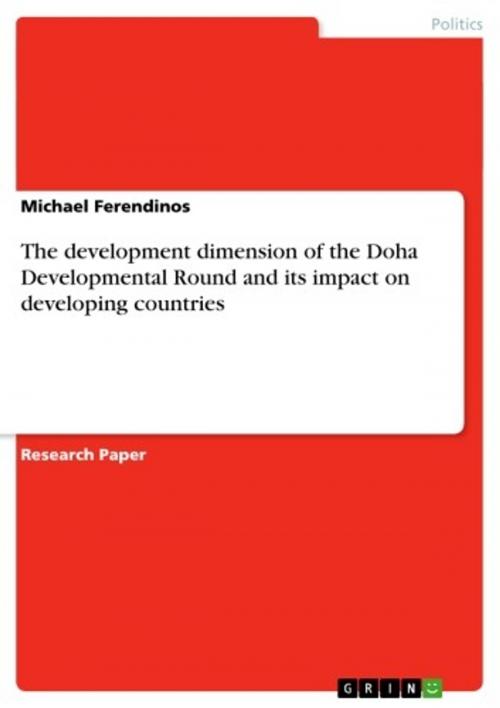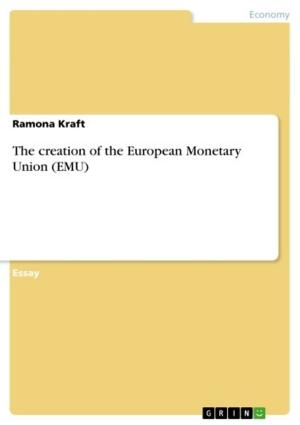The development dimension of the Doha Developmental Round and its impact on developing countries
Nonfiction, Social & Cultural Studies, Political Science| Author: | Michael Ferendinos | ISBN: | 9783640270156 |
| Publisher: | GRIN Publishing | Publication: | February 17, 2009 |
| Imprint: | GRIN Publishing | Language: | English |
| Author: | Michael Ferendinos |
| ISBN: | 9783640270156 |
| Publisher: | GRIN Publishing |
| Publication: | February 17, 2009 |
| Imprint: | GRIN Publishing |
| Language: | English |
Research Paper (postgraduate) from the year 2007 in the subject Politics - International Politics - Topic: Globalization, Political Economics, grade: B, Stellenbosch Universitiy, course: Global Political Economy, 13 entries in the bibliography, language: English, abstract: The fourth WTO Ministerial Conference at Doha, Qatar in November 2001, dubbed the 'Doha Developmental Round', signalled a significant shift in focus within the World Trade Organisation (WTO) as it recognized the economic developmental needs of low income countries. This paper will assess the development dimension of the negotiations focussing on the extent to which this offers developing countries policy space and flexibilities to pursue developmental objectives. The WTO advocated the implementation of special and differential (S&D) treatment in order to assist with the plight of developing countries. This paper acknowledges the importance of S&D treatment, but argues that it is not sufficient as a solitary approach to development. In an adaptation of Amartya Sen's conceptualisation of development as the process of expanding human freedoms; Faizel Ismail highlights four elements of the development dimension of the multilateral trading system, namely: fair trade, capacity building, balanced rules, and good governance. The paper will begin with a brief overview of the evolution of the trading system itself, from GATT to the WTO. Thereafter it will look at the Relationship between development and trade, focussing particularly on NAMA and S&D treatment. Following this will be a brief analysis of the effect of WTO negotiations on developing countries; ending off with a look at how the WTO can be restructured to accommodate the interests of developing countries. [...]
Research Paper (postgraduate) from the year 2007 in the subject Politics - International Politics - Topic: Globalization, Political Economics, grade: B, Stellenbosch Universitiy, course: Global Political Economy, 13 entries in the bibliography, language: English, abstract: The fourth WTO Ministerial Conference at Doha, Qatar in November 2001, dubbed the 'Doha Developmental Round', signalled a significant shift in focus within the World Trade Organisation (WTO) as it recognized the economic developmental needs of low income countries. This paper will assess the development dimension of the negotiations focussing on the extent to which this offers developing countries policy space and flexibilities to pursue developmental objectives. The WTO advocated the implementation of special and differential (S&D) treatment in order to assist with the plight of developing countries. This paper acknowledges the importance of S&D treatment, but argues that it is not sufficient as a solitary approach to development. In an adaptation of Amartya Sen's conceptualisation of development as the process of expanding human freedoms; Faizel Ismail highlights four elements of the development dimension of the multilateral trading system, namely: fair trade, capacity building, balanced rules, and good governance. The paper will begin with a brief overview of the evolution of the trading system itself, from GATT to the WTO. Thereafter it will look at the Relationship between development and trade, focussing particularly on NAMA and S&D treatment. Following this will be a brief analysis of the effect of WTO negotiations on developing countries; ending off with a look at how the WTO can be restructured to accommodate the interests of developing countries. [...]















